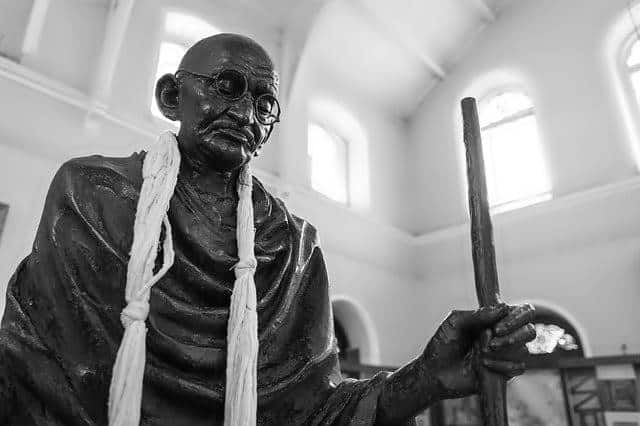The words “Gandhi” and “Vinoba” evoke deep admiration and reverence in the hearts Relevance of Gandhi and Vinoba of millions around the world. These two eminent personalities played a crucial role in shaping the history of India, leaving an indelible mark on the nation and inspiring countless individuals across the globe. Today, their ideologies and philosophies continue to hold immense relevance in a world marred by violence, injustice, and inequality.
Mahatma Gandhi, also known as the Father of the Nation in India, was a beacon of hope and a guiding light during the struggle for independence from British colonial rule. His philosophy centered around non-violence, truth, and self-sufficiency. At a time when armed resistance seemed like the only viable option against British tyranny, Gandhi’s adherence to non-violence showed the world the power of peaceful resistance Relevance of Gandhi and Vinoba .

You can read our another post on Twin Temple of Gandharadi: A Marvel of Ancient Architecture
Gandhi’s teachings emphasized the importance of equality, tolerance, and compassion for all. His belief in the dignity of labor led him to work towards the upliftment of marginalized communities, especially the untouchables. Through acts such as the famous Salt March and his advocacy for self-reliance through spinning khadi (hand-spun cloth), Gandhi aimed to mobilize the masses Relevance of Gandhi and Vinoba and empower them to stand up against injustice.
Vinoba Bhave, a close follower of Gandhi, carried forward his mentor’s legacy and became a prominent figure in the post-independence era in India. He dedicated his life to the eradication of poverty and the upliftment of the landless farmers. Vinoba’s movement, known as the Relevance of Gandhi and Vinoba Bhoodan (land gift) Movement, aimed to persuade wealthy landowners to voluntarily donate land to the landless. This act of selflessness and compassion not only helped address the issue of land redistribution but also fostered a sense of community and collective responsibility.
The relevance of Gandhi and Vinoba’s teachings extends far beyond India’s struggle for Relevance of Gandhi and Vinoba independence. In a world grappling with persistent conflicts, economic disparities, and environmental degradation, their ideologies offer a way forward.
Firstly, the non-violent approach advocated by Gandhi and followed by Vinoba reminds us of the power of dialogue, understanding, and empathy in resolving conflicts. From the civil rights movement in the United States to the struggle for independence in South Africa, non-violent resistance has proven effective in galvanizing social change. Today, we witness the impact of non-violent protests demanding racial justice, climate action, and gender equality, illustrating the continued relevance of this ideology.
Secondly, both Gandhi and Vinoba emphasized the need for self-sufficiency and sustainable living. At a time when the world faces the grave challenges of climate change and resource depletion, their teachings on simplicity and self-reliance resonate deeply. By promoting practices such as organic farming, renewable energy, and responsible consumption, we can build a more sustainable and equitable future for generations to come.
More: Wanted to download Odishashop.com visit here
Lastly, Gandhi and Vinoba’s emphasis on empathy and societal responsibility serves as a powerful reminder in a world that often prioritizes individual gain over collective well-being. Through their actions, they exemplified that societal progress lies in the hands of each individual. By inspiring citizens to actively contribute to the betterment of their communities, a ripple effect can be created, leading to transformative change.
Write A FAQ For Relevance of Gandhi and Vinoba
Who were Gandhi and Vinoba, and why are they still relevant today?
Gandhi, also known as Mahatma Gandhi, was the leader of India’s independence movement against British rule in the early 20th century. Vinoba Bhave was a disciple of Gandhi and a prominent social reformer. Both Gandhi and Vinoba championed principles of nonviolence, truth, self-reliance, and social equality, which are still relevant for issues such as peace-building, human rights, and sustainable development.
How did Gandhi and Vinoba promote nonviolence and its relevance today?
Gandhi and Vinoba emphasized the power of nonviolent resistance and civil disobedience as a means to fight injustice and oppression. Their approach influenced many global movements, including the civil rights movement in the United States. In today’s world, their teachings can inspire conflict resolution, peaceful protests, and promoting a culture of empathy and understanding.
What was the role of Gandhi and Vinoba in India’s fight for independence?
Gandhi’s leadership and philosophy of nonviolence played a pivotal role in India’s struggle for independence from British colonial rule. He mobilized millions of Indians through peaceful protests, boycotts, and acts of civil disobedience. Vinoba, on the other hand, was closely associated with the Bhoodan Movement, through which he sought to peacefully redistribute land to landless farmers. Their contributions and ideologies remain respected and continuing to inspire activists and leaders worldwide.
How did Gandhi and Vinoba influence social and economic reforms?
Gandhi and Vinoba were strong proponents of social and economic equality. They worked towards uplifting India’s marginalized communities, such as untouchables and peasants, and aimed to eradicate poverty and inequality. Through the establishment of institutions like ashrams, community development programs, and emphasis on self-reliance, they laid the foundation for grassroots movements and empowerment of the marginalized. Their principles are still relevant for addressing social inequality and promoting sustainable development.
How can we apply Gandhi and Vinoba’s teachings in today’s world?
Gandhi and Vinoba’s teachings provide valuable lessons for individuals and societies. Their emphasis on nonviolence, truth, self-reliance, and social justice can guide us in addressing diverse issues such as climate change, discrimination, poverty, and inequality. By embracing their principles, we can work towards peaceful coexistence, sustainable development, and fostering a more just and equal society.
Conclusion
In conclusion, the relevance of Gandhi and Vinoba in today’s world cannot be overstated. Their teachings continue to hold immense value in our quest for justice, peace, and sustainable development. By upholding their legacy, we can strive towards a world where violence is replaced by understanding, inequality is eradicated, and every individual has an equal opportunity to thrive.
